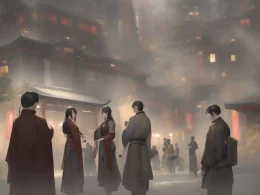Idiom Explanation:
The rope of the bamboo slips was broken three times. It is a metaphor for diligent study and hard work.
Pronunciation:
韦编三绝
wéi biān sān jué
Origin:
《史记·孔子世家》:“孔子晚而喜《易》,序彖、系、象、说卦、文言。读《易》,韦编三绝。假我数年,若是,我于《易》则彬彬矣。”
Story:
Confucius was a Chinese thinker, statesman and founder of the Confucian school at the end of the Spring and Autumn Period. His name was Qiu, and his name was Zhongni, and he was a native of Cuyi in the State of Lu (now southeast of Qufu in Shandong Province). His ancestors were nobles of the Song state, and he was versatile and knowledgeable.
Confucius once said that he had learned all his knowledge through hard work and study. Confucius lost his father when he was young and his family was poor, so he was not able to receive a good education and had to learn by himself. Since he was fifteen years old, he began to study with fervor, and since he had no one to teach him, he asked for advice when he encountered problems in his studies. He consulted officials, ordinary people, old men with gray hair, and children with pigtails on their heads. Confucius was so open-minded and willing to learn that he became a famous scholar in the region at the age of thirty.
At that time, there was no paper, and the material for making books was mainly bamboo. Generally, the bamboo was cut into pieces, scraped off the green skin, dried by fire, and then engraved on it, called "bamboo jian". Bamboo has a certain length and width, a bamboo can only write a line of words, more than a few dozen, less than eight or nine. Write a book to many bamboo, the book's content is all written up after, to use a strong cowhide rope to these bamboo pieces in order to weave together, you can read, so the process is called "wei cod". Because a piece of bamboo can only write a very small number of words, so if a book has a lot of words, it will require dozens of pounds or even hundreds of pounds of bamboo. A book like the I Ching, of course, is made up of many bamboo slips and is therefore quite heavy.
Confucius only began to study the I Ching in his later years. The I Ching was a very difficult ancient book to read and understand, and it took Confucius a great deal of effort to read it all once, but he only basically understood its content. Then he read it a second time and mastered its basic points. Then, he read it a third time, and got a more thorough understanding of its spirit and substance. Thereafter, in order to study the book in depth and to explain it to his disciples, he went through the I Ching for an unknown number of times, reading it over and over again, breaking the cattle belt that strung the bamboo slips several times and having to replace it with a new one. Even after reading to such an extent, Confucius modestly said, "If I could live a few more years, I would be able to understand some of the words and contents of the I Ching."
Confucius also compiled a number of books during his life, including several books such as the Poem and the Book, as well as the Spring and Autumn Annals, a history book based on historical materials from the state of Lu. This played a positive role in the preservation and development of ancient culture.
Similar Idioms:
- 悬梁刺骨
- 孜孜不倦
- 废寝忘食












